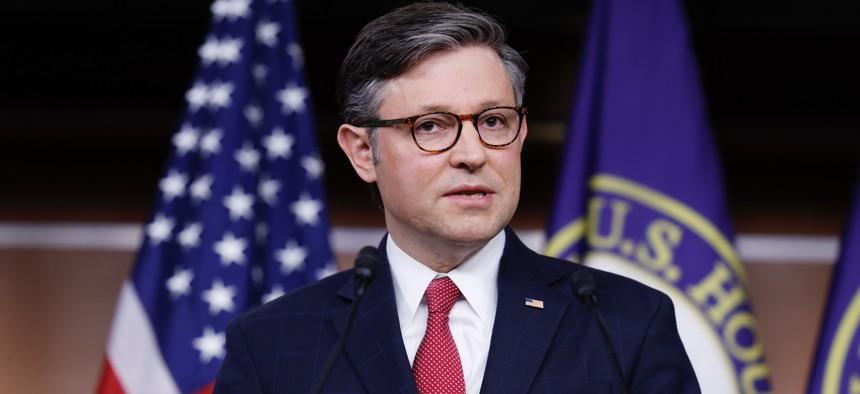Congress passes stopgap funding bill, delaying shutdown threat by one week

Speaker of the House Mike Johnson, R-La., speaks during a news conference with House Republican leadership on Feb. 29, 2024. Anna Moneymaker / GETTY IMAGES
Congress hopes to begin voting on full-year appropriations next week.
Updated Feb. 29 to note the Senate passed the bill
Both houses of Congress on Thursday approved a stopgap spending measure to move two funding deadlines later into March, sending the funding bill to President Biden just one before a partial shutdown was set to begin this weekend.
The measure will punt the deadline for the agencies facing a budget cessation Friday evening by one week, while extending the shutdown date for others by two weeks to March 22. The measure won broad, bipartisan support both chambers, despite opposition from some conservatives who demanded spending cuts.
The Senate acted quickly on Thursday evening after the House approved the bill earlier in the day.
Its final approval will set up a vote on the first “minibus” appropriations package next week. That will include funding for the departments of Agriculture, Energy, Housing and Urban Development, Transportation, Veterans Affairs, Interior, Commerce and Justice, as well as the Environmental Protection Agency and a few other agencies, all of which would, under the revised timeline, otherwise see their funding expire March 8. Negotiations over those bills are complete, lawmakers said on Wednesday, and staff are now writing the final legislative text that will be unveiled over the weekend.
Congressional leaders set up the current iteration of the two-tiered continuing resolution, accompanied by two minibus spending bills, in an agreement they announced Wednesday evening. Appropriators are still negotiating the final provisions of the second minibus that will fund the rest of the government and will have about three weeks to avert a partial shutdown.
Lawmakers had originally hoped to finalize text last weekend to tee up a vote on full-year funding bills this week, but missed that goal after talks stalled. The process ramped back up on Tuesday after leaders from both parties met with President Biden and agreed on a path to avert a shutdown.
House Speaker Mike Johnson, R-La., on Thursday praised the deal, even while lamenting the arduous path to get to this point.
“The appropriations process is ugly,” Johnson said. “Democracy is ugly.”
Still, he lauded his push to create a two-tiered CR system in which different agencies’ funding expired at different times. That has led to Congress considering two minibus packages to set spending levels in fiscal 2024, rather than one omnibus. He also noted his colleagues will maintain 72 hours to review the bill prior to a vote.
The exact allocations for each agency and federal program have not yet been released, but congressional leaders previously agreed to a top-line spending level of $1.66 trillion for fiscal 2024. Defense spending is set to jump 3% to $886 billion and non-defense spending will stay essentially flat relative to fiscal 2023 at nearly $773 billion. While the allocations for each of the 12 spending bills lawmakers must pass each year were previously set, negotiators have been working tirelessly to determine which policy riders to include.
Quick action in the Senate required unanimous agreement from all senators, which it got after agreeing to several failed amendment votes. More than 75,000 employees would have faced furloughs if lawmakers had failed to act by this weekend's deadline.
Even if Congress can quickly pass full-year funding bills, the fiscal year will be nearly halfway over and agencies will be under pressure to get the money out the door in an expedited timeline. The problem is one with which agencies have familiarity, however, and that they last confronted in fiscal 2022 when Congress also approved appropriations in mid-March.
If negotiations over the second tranche of agency spending stall and Congress must buy more time, the legislative body could butt up against a provision of the 2023 debt ceiling law that would force devastating, across-the-board cuts that automatically kick in if a CR is still in place in May. Already, several agencies have implemented policies to adapt to budget shortfalls.
